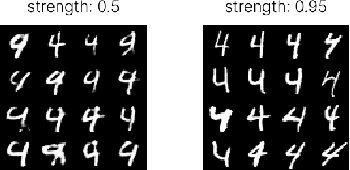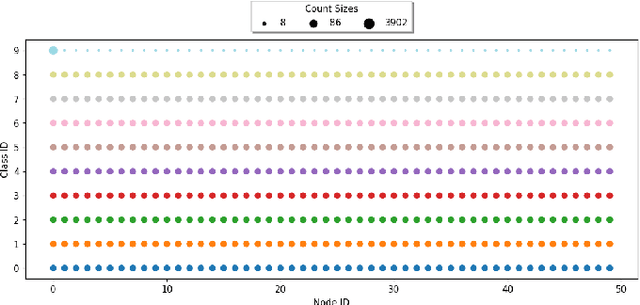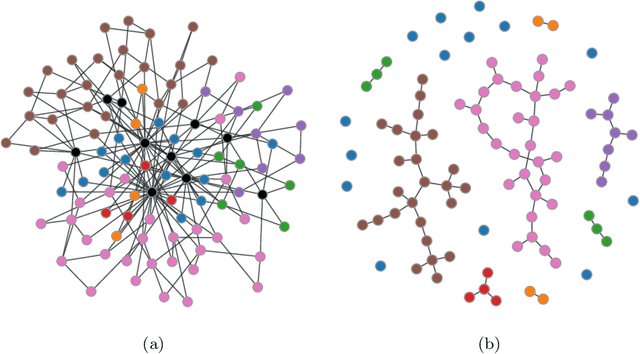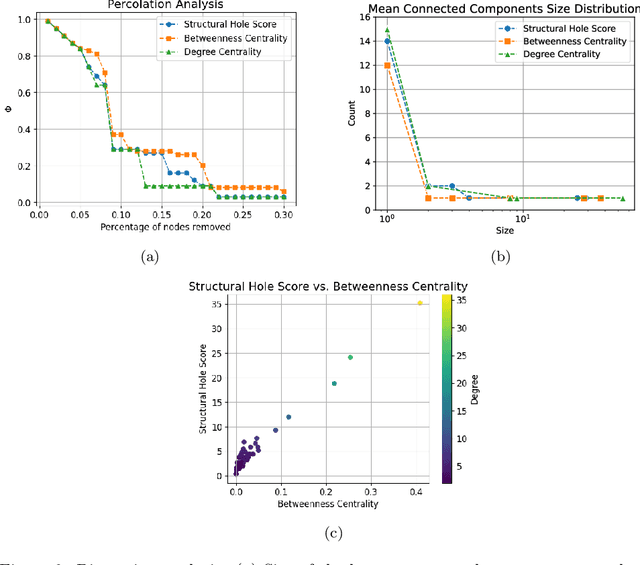Andrea Passarella
DecHW: Heterogeneous Decentralized Federated Learning Exploiting Second-Order Information
Jan 16, 2026Abstract:Decentralized Federated Learning (DFL) is a serverless collaborative machine learning paradigm where devices collaborate directly with neighbouring devices to exchange model information for learning a generalized model. However, variations in individual experiences and different levels of device interactions lead to data and model initialization heterogeneities across devices. Such heterogeneities leave variations in local model parameters across devices that leads to slower convergence. This paper tackles the data and model heterogeneity by explicitly addressing the parameter level varying evidential credence across local models. A novel aggregation approach is introduced that captures these parameter variations in local models and performs robust aggregation of neighbourhood local updates. Specifically, consensus weights are generated via approximation of second-order information of local models on their local datasets. These weights are utilized to scale neighbourhood updates before aggregating them into global neighbourhood representation. In extensive experiments with computer vision tasks, the proposed approach shows strong generalizability of local models at reduced communication costs.
Towards Robust Expert Finding in Community Question Answering Platforms
Mar 04, 2025Abstract:This paper introduces TUEF, a topic-oriented user-interaction model for fair Expert Finding in Community Question Answering (CQA) platforms. The Expert Finding task in CQA platforms involves identifying proficient users capable of providing accurate answers to questions from the community. To this aim, TUEF improves the robustness and credibility of the CQA platform through a more precise Expert Finding component. The key idea of TUEF is to exploit diverse types of information, specifically, content and social information, to identify more precisely experts thus improving the robustness of the task. We assess TUEF through reproducible experiments conducted on a large-scale dataset from StackOverflow. The results consistently demonstrate that TUEF outperforms state-of-the-art competitors while promoting transparent expert identification.
The Built-In Robustness of Decentralized Federated Averaging to Bad Data
Feb 25, 2025



Abstract:Decentralized federated learning (DFL) enables devices to collaboratively train models over complex network topologies without relying on a central controller. In this setting, local data remains private, but its quality and quantity can vary significantly across nodes. The extent to which a fully decentralized system is vulnerable to poor-quality or corrupted data remains unclear, but several factors could contribute to potential risks. Without a central authority, there can be no unified mechanism to detect or correct errors, and each node operates with a localized view of the data distribution, making it difficult for the node to assess whether its perspective aligns with the true distribution. Moreover, models trained on low-quality data can propagate through the network, amplifying errors. To explore the impact of low-quality data on DFL, we simulate two scenarios with degraded data quality -- one where the corrupted data is evenly distributed in a subset of nodes and one where it is concentrated on a single node -- using a decentralized implementation of FedAvg. Our results reveal that averaging-based decentralized learning is remarkably robust to localized bad data, even when the corrupted data resides in the most influential nodes of the network. Counterintuitively, this robustness is further enhanced when the corrupted data is concentrated on a single node, regardless of its centrality in the communication network topology. This phenomenon is explained by the averaging process, which ensures that no single node -- however central -- can disproportionately influence the overall learning process.
Federated Clustering: An Unsupervised Cluster-Wise Training for Decentralized Data Distributions
Aug 20, 2024



Abstract:Federated Learning (FL) is a pivotal approach in decentralized machine learning, especially when data privacy is crucial and direct data sharing is impractical. While FL is typically associated with supervised learning, its potential in unsupervised scenarios is underexplored. This paper introduces a novel unsupervised federated learning methodology designed to identify the complete set of categories (global K) across multiple clients within label-free, non-uniform data distributions, a process known as Federated Clustering. Our approach, Federated Cluster-Wise Refinement (FedCRef), involves clients that collaboratively train models on clusters with similar data distributions. Initially, clients with diverse local data distributions (local K) train models on their clusters to generate compressed data representations. These local models are then shared across the network, enabling clients to compare them through reconstruction error analysis, leading to the formation of federated groups.In these groups, clients collaboratively train a shared model representing each data distribution, while continuously refining their local clusters to enhance data association accuracy. This iterative process allows our system to identify all potential data distributions across the network and develop robust representation models for each. To validate our approach, we compare it with traditional centralized methods, establishing a performance baseline and showcasing the advantages of our distributed solution. We also conduct experiments on the EMNIST and KMNIST datasets, demonstrating FedCRef's ability to refine and align cluster models with actual data distributions, significantly improving data representation precision in unsupervised federated settings.
FedQUIT: On-Device Federated Unlearning via a Quasi-Competent Virtual Teacher
Aug 14, 2024Abstract:Federated Learning (FL) promises better privacy guarantees for individuals' data when machine learning models are collaboratively trained. When an FL participant exercises its right to be forgotten, i.e., to detach from the FL framework it has participated and to remove its past contributions to the global model, the FL solution should perform all the necessary steps to make it possible without sacrificing the overall performance of the global model, which is not supported in state-of-the-art related solutions nowadays. In this paper, we propose FedQUIT, a novel algorithm that uses knowledge distillation to scrub the contribution of the forgetting data from an FL global model while preserving its generalization ability. FedQUIT directly works on clients' devices and does not require sharing additional information if compared with a regular FL process, nor does it assume the availability of publicly available proxy data. Our solution is efficient, effective, and applicable in both centralized and federated settings. Our experimental results show that, on average, FedQUIT requires less than 2.5% additional communication rounds to recover generalization performances after unlearning, obtaining a sanitized global model whose predictions are comparable to those of a global model that has never seen the data to be forgotten.
Understanding and Addressing Gender Bias in Expert Finding Task
Jul 07, 2024



Abstract:The Expert Finding (EF) task is critical in community Question&Answer (CQ&A) platforms, significantly enhancing user engagement by improving answer quality and reducing response times. However, biases, especially gender biases, have been identified in these platforms. This study investigates gender bias in state-of-the-art EF models and explores methods to mitigate it. Utilizing a comprehensive dataset from StackOverflow, the largest community in the StackExchange network, we conduct extensive experiments to analyze how EF models' candidate identification processes influence gender representation. Our findings reveal that models relying on reputation metrics and activity levels disproportionately favor male users, who are more active on the platform. This bias results in the underrepresentation of female experts in the ranking process. We propose adjustments to EF models that incorporate a more balanced preprocessing strategy and leverage content-based and social network-based information, with the aim to provide a fairer representation of genders among identified experts. Our analysis shows that integrating these methods can significantly enhance gender balance without compromising model accuracy. To the best of our knowledge, this study is the first to focus on detecting and mitigating gender bias in EF methods.
Leveraging Topic Specificity and Social Relationships for Expert Finding in Community Question Answering Platforms
Jul 04, 2024



Abstract:Online Community Question Answering (CQA) platforms have become indispensable tools for users seeking expert solutions to their technical queries. The effectiveness of these platforms relies on their ability to identify and direct questions to the most knowledgeable users within the community, a process known as Expert Finding (EF). EF accuracy is crucial for increasing user engagement and the reliability of provided answers. Despite recent advancements in EF methodologies, blending the diverse information sources available on CQA platforms for effective expert identification remains challenging. In this paper, we present TUEF, a Topic-oriented User-Interaction model for Expert Finding, which aims to fully and transparently leverage the heterogeneous information available within online question-answering communities. TUEF integrates content and social data by constructing a multi-layer graph that maps out user relationships based on their answering patterns on specific topics. By combining these sources of information, TUEF identifies the most relevant and knowledgeable users for any given question and ranks them using learning-to-rank techniques. Our findings indicate that TUEF's topic-oriented model significantly enhances performance, particularly in large communities discussing well-defined topics. Additionally, we show that the interpretable learning-to-rank algorithm integrated into TUEF offers transparency and explainability with minimal performance trade-offs. The exhaustive experiments conducted on six different CQA communities of Stack Exchange show that TUEF outperforms all competitors with a minimum performance boost of 42.42% in P@1, 32.73% in NDCG@3, 21.76% in R@5, and 29.81% in MRR, excelling in both the evaluation approaches present in the previous literature.
Robustness of Decentralised Learning to Nodes and Data Disruption
May 03, 2024



Abstract:In the vibrant landscape of AI research, decentralised learning is gaining momentum. Decentralised learning allows individual nodes to keep data locally where they are generated and to share knowledge extracted from local data among themselves through an interactive process of collaborative refinement. This paradigm supports scenarios where data cannot leave local nodes due to privacy or sovereignty reasons or real-time constraints imposing proximity of models to locations where inference has to be carried out. The distributed nature of decentralised learning implies significant new research challenges with respect to centralised learning. Among them, in this paper, we focus on robustness issues. Specifically, we study the effect of nodes' disruption on the collective learning process. Assuming a given percentage of "central" nodes disappear from the network, we focus on different cases, characterised by (i) different distributions of data across nodes and (ii) different times when disruption occurs with respect to the start of the collaborative learning task. Through these configurations, we are able to show the non-trivial interplay between the properties of the network connecting nodes, the persistence of knowledge acquired collectively before disruption or lack thereof, and the effect of data availability pre- and post-disruption. Our results show that decentralised learning processes are remarkably robust to network disruption. As long as even minimum amounts of data remain available somewhere in the network, the learning process is able to recover from disruptions and achieve significant classification accuracy. This clearly varies depending on the remaining connectivity after disruption, but we show that even nodes that remain completely isolated can retain significant knowledge acquired before the disruption.
Optimizing Risk-averse Human-AI Hybrid Teams
Mar 13, 2024



Abstract:We anticipate increased instances of humans and AI systems working together in what we refer to as a hybrid team. The increase in collaboration is expected as AI systems gain proficiency and their adoption becomes more widespread. However, their behavior is not error-free, making hybrid teams a very suitable solution. As such, we consider methods for improving performance for these teams of humans and AI systems. For hybrid teams, we will refer to both the humans and AI systems as agents. To improve team performance over that seen for agents operating individually, we propose a manager which learns, through a standard Reinforcement Learning scheme, how to best delegate, over time, the responsibility of taking a decision to any of the agents. We further guide the manager's learning so they also minimize how many changes in delegation are made resulting from undesirable team behavior. We demonstrate the optimality of our manager's performance in several grid environments which include failure states which terminate an episode and should be avoided. We perform our experiments with teams of agents with varying degrees of acceptable risk, in the form of proximity to a failure state, and measure the manager's ability to make effective delegation decisions with respect to its own risk-based constraints, then compare these to the optimal decisions. Our results show our manager can successfully learn desirable delegations which result in team paths near/exactly optimal with respect to path length and number of delegations.
Impact of network topology on the performance of Decentralized Federated Learning
Feb 28, 2024



Abstract:Fully decentralized learning is gaining momentum for training AI models at the Internet's edge, addressing infrastructure challenges and privacy concerns. In a decentralized machine learning system, data is distributed across multiple nodes, with each node training a local model based on its respective dataset. The local models are then shared and combined to form a global model capable of making accurate predictions on new data. Our exploration focuses on how different types of network structures influence the spreading of knowledge - the process by which nodes incorporate insights gained from learning patterns in data available on other nodes across the network. Specifically, this study investigates the intricate interplay between network structure and learning performance using three network topologies and six data distribution methods. These methods consider different vertex properties, including degree centrality, betweenness centrality, and clustering coefficient, along with whether nodes exhibit high or low values of these metrics. Our findings underscore the significance of global centrality metrics (degree, betweenness) in correlating with learning performance, while local clustering proves less predictive. We highlight the challenges in transferring knowledge from peripheral to central nodes, attributed to a dilution effect during model aggregation. Additionally, we observe that central nodes exert a pull effect, facilitating the spread of knowledge. In examining degree distribution, hubs in Barabasi-Albert networks positively impact learning for central nodes but exacerbate dilution when knowledge originates from peripheral nodes. Finally, we demonstrate the formidable challenge of knowledge circulation outside of segregated communities.
 Add to Chrome
Add to Chrome Add to Firefox
Add to Firefox Add to Edge
Add to Edge